Marriott Hotel: Professional Identity and Practice - Unit 3 Report
VerifiedAdded on 2023/01/11
|12
|3190
|43
Report
AI Summary
This report provides an analysis of professional identity and practice, using Marriott Hotel as a case study. It explores the benefits of ongoing professional development for both the employer and employees, emphasizing the importance of a skilled workforce, competitive advantage, and employee engagement. The report examines professional expectations, including maintaining professional standards and projecting a positive brand image. It categorizes and discusses essential skills like business, soft, and hard skills within the hospitality sector, focusing on customer service. The report also details self-assessment approaches and techniques, such as SWOT analysis, personality assessments, and the Belbin team roles model. Finally, it compares job specifications with required skills and outlines different learning approaches, including behaviorist, cognitive, and humanist models, to enhance professional development within the organization.
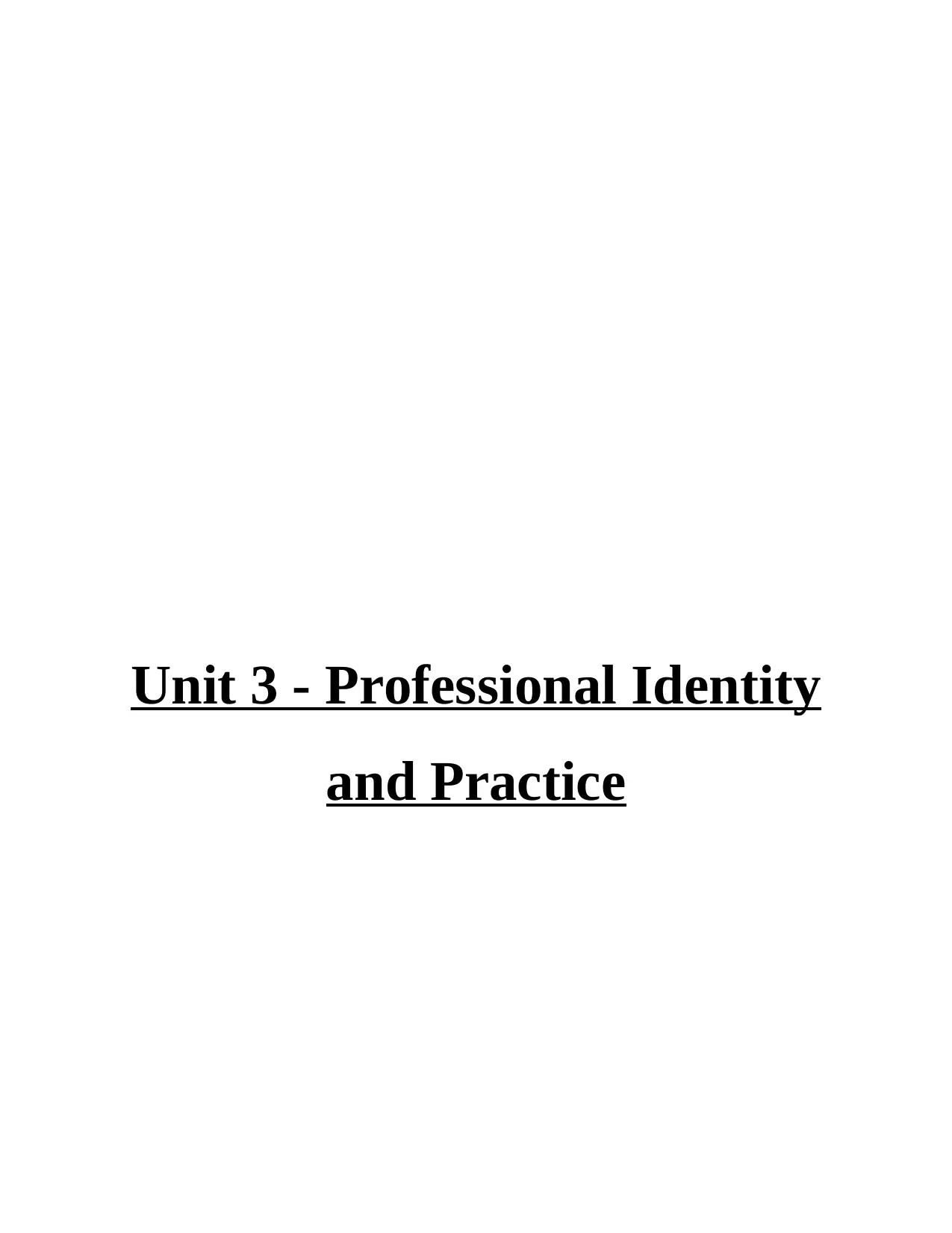
Unit 3 - Professional Identity
and Practice
and Practice
Paraphrase This Document
Need a fresh take? Get an instant paraphrase of this document with our AI Paraphraser
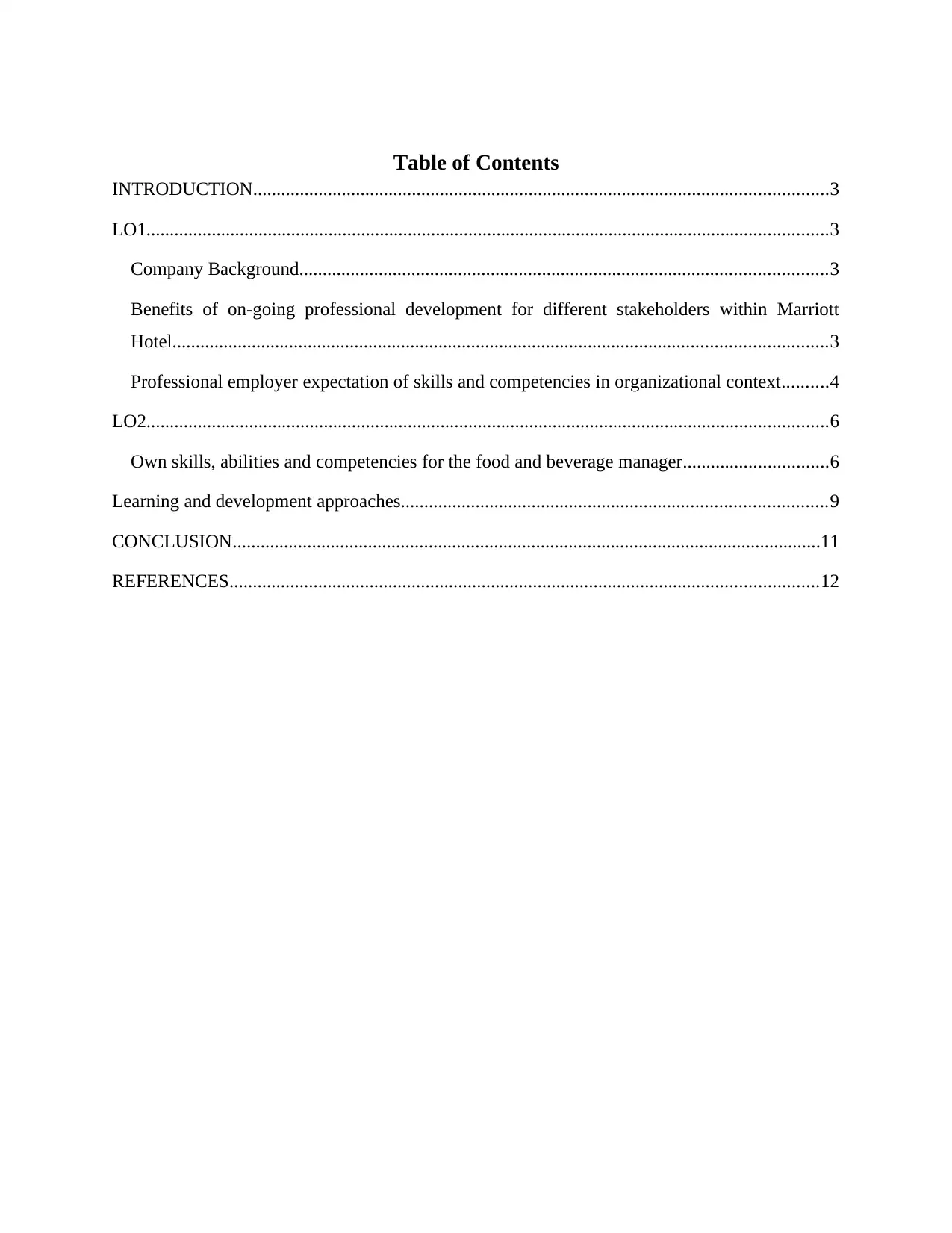
Table of Contents
INTRODUCTION...........................................................................................................................3
LO1..................................................................................................................................................3
Company Background.................................................................................................................3
Benefits of on-going professional development for different stakeholders within Marriott
Hotel............................................................................................................................................3
Professional employer expectation of skills and competencies in organizational context..........4
LO2..................................................................................................................................................6
Own skills, abilities and competencies for the food and beverage manager...............................6
Learning and development approaches...........................................................................................9
CONCLUSION..............................................................................................................................11
REFERENCES..............................................................................................................................12
INTRODUCTION...........................................................................................................................3
LO1..................................................................................................................................................3
Company Background.................................................................................................................3
Benefits of on-going professional development for different stakeholders within Marriott
Hotel............................................................................................................................................3
Professional employer expectation of skills and competencies in organizational context..........4
LO2..................................................................................................................................................6
Own skills, abilities and competencies for the food and beverage manager...............................6
Learning and development approaches...........................................................................................9
CONCLUSION..............................................................................................................................11
REFERENCES..............................................................................................................................12
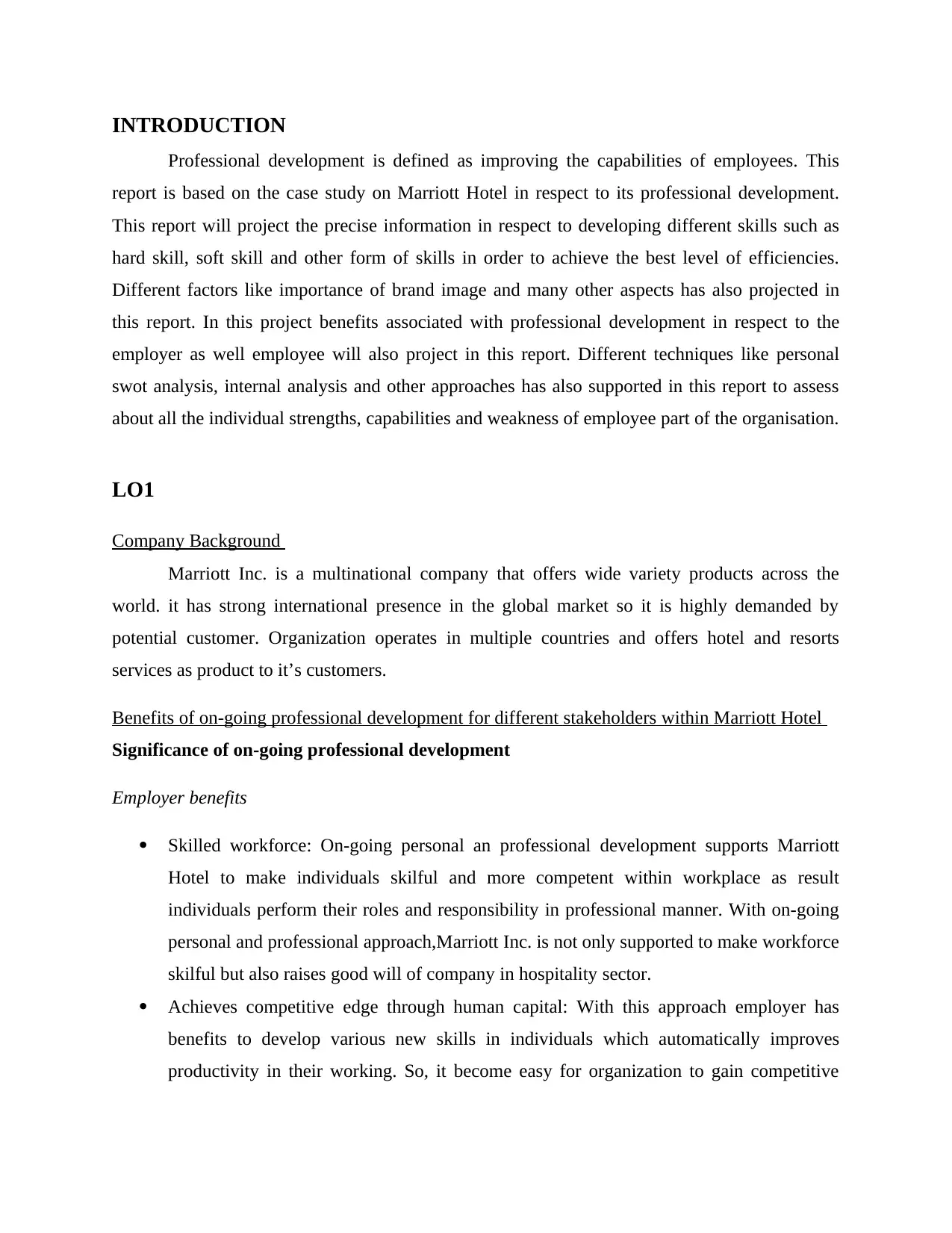
INTRODUCTION
Professional development is defined as improving the capabilities of employees. This
report is based on the case study on Marriott Hotel in respect to its professional development.
This report will project the precise information in respect to developing different skills such as
hard skill, soft skill and other form of skills in order to achieve the best level of efficiencies.
Different factors like importance of brand image and many other aspects has also projected in
this report. In this project benefits associated with professional development in respect to the
employer as well employee will also project in this report. Different techniques like personal
swot analysis, internal analysis and other approaches has also supported in this report to assess
about all the individual strengths, capabilities and weakness of employee part of the organisation.
LO1
Company Background
Marriott Inc. is a multinational company that offers wide variety products across the
world. it has strong international presence in the global market so it is highly demanded by
potential customer. Organization operates in multiple countries and offers hotel and resorts
services as product to it’s customers.
Benefits of on-going professional development for different stakeholders within Marriott Hotel
Significance of on-going professional development
Employer benefits
Skilled workforce: On-going personal an professional development supports Marriott
Hotel to make individuals skilful and more competent within workplace as result
individuals perform their roles and responsibility in professional manner. With on-going
personal and professional approach,Marriott Inc. is not only supported to make workforce
skilful but also raises good will of company in hospitality sector.
Achieves competitive edge through human capital: With this approach employer has
benefits to develop various new skills in individuals which automatically improves
productivity in their working. So, it become easy for organization to gain competitive
Professional development is defined as improving the capabilities of employees. This
report is based on the case study on Marriott Hotel in respect to its professional development.
This report will project the precise information in respect to developing different skills such as
hard skill, soft skill and other form of skills in order to achieve the best level of efficiencies.
Different factors like importance of brand image and many other aspects has also projected in
this report. In this project benefits associated with professional development in respect to the
employer as well employee will also project in this report. Different techniques like personal
swot analysis, internal analysis and other approaches has also supported in this report to assess
about all the individual strengths, capabilities and weakness of employee part of the organisation.
LO1
Company Background
Marriott Inc. is a multinational company that offers wide variety products across the
world. it has strong international presence in the global market so it is highly demanded by
potential customer. Organization operates in multiple countries and offers hotel and resorts
services as product to it’s customers.
Benefits of on-going professional development for different stakeholders within Marriott Hotel
Significance of on-going professional development
Employer benefits
Skilled workforce: On-going personal an professional development supports Marriott
Hotel to make individuals skilful and more competent within workplace as result
individuals perform their roles and responsibility in professional manner. With on-going
personal and professional approach,Marriott Inc. is not only supported to make workforce
skilful but also raises good will of company in hospitality sector.
Achieves competitive edge through human capital: With this approach employer has
benefits to develop various new skills in individuals which automatically improves
productivity in their working. So, it become easy for organization to gain competitive
⊘ This is a preview!⊘
Do you want full access?
Subscribe today to unlock all pages.

Trusted by 1+ million students worldwide
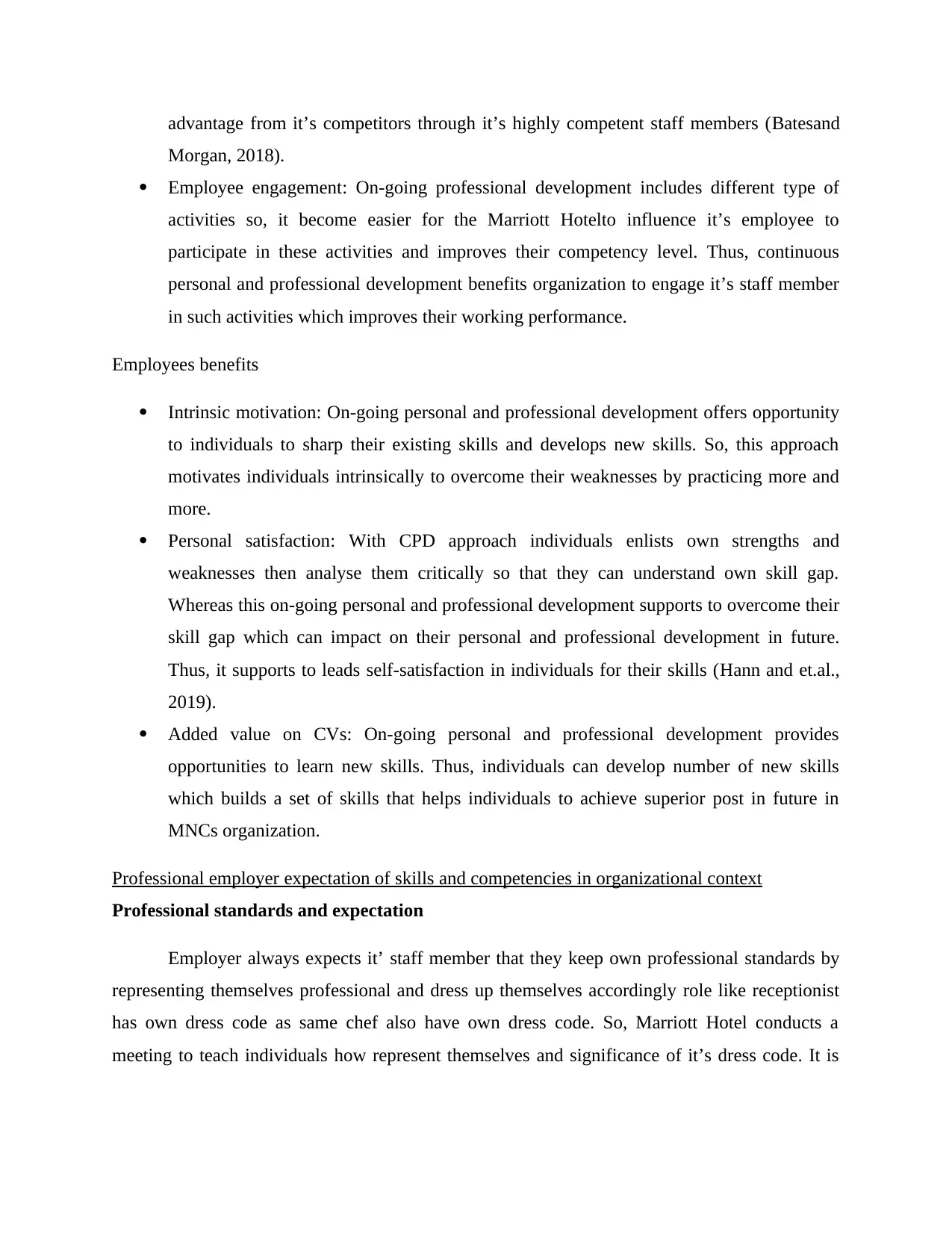
advantage from it’s competitors through it’s highly competent staff members (Batesand
Morgan, 2018).
Employee engagement: On-going professional development includes different type of
activities so, it become easier for the Marriott Hotelto influence it’s employee to
participate in these activities and improves their competency level. Thus, continuous
personal and professional development benefits organization to engage it’s staff member
in such activities which improves their working performance.
Employees benefits
Intrinsic motivation: On-going personal and professional development offers opportunity
to individuals to sharp their existing skills and develops new skills. So, this approach
motivates individuals intrinsically to overcome their weaknesses by practicing more and
more.
Personal satisfaction: With CPD approach individuals enlists own strengths and
weaknesses then analyse them critically so that they can understand own skill gap.
Whereas this on-going personal and professional development supports to overcome their
skill gap which can impact on their personal and professional development in future.
Thus, it supports to leads self-satisfaction in individuals for their skills (Hann and et.al.,
2019).
Added value on CVs: On-going personal and professional development provides
opportunities to learn new skills. Thus, individuals can develop number of new skills
which builds a set of skills that helps individuals to achieve superior post in future in
MNCs organization.
Professional employer expectation of skills and competencies in organizational context
Professional standards and expectation
Employer always expects it’ staff member that they keep own professional standards by
representing themselves professional and dress up themselves accordingly role like receptionist
has own dress code as same chef also have own dress code. So, Marriott Hotel conducts a
meeting to teach individuals how represent themselves and significance of it’s dress code. It is
Morgan, 2018).
Employee engagement: On-going professional development includes different type of
activities so, it become easier for the Marriott Hotelto influence it’s employee to
participate in these activities and improves their competency level. Thus, continuous
personal and professional development benefits organization to engage it’s staff member
in such activities which improves their working performance.
Employees benefits
Intrinsic motivation: On-going personal and professional development offers opportunity
to individuals to sharp their existing skills and develops new skills. So, this approach
motivates individuals intrinsically to overcome their weaknesses by practicing more and
more.
Personal satisfaction: With CPD approach individuals enlists own strengths and
weaknesses then analyse them critically so that they can understand own skill gap.
Whereas this on-going personal and professional development supports to overcome their
skill gap which can impact on their personal and professional development in future.
Thus, it supports to leads self-satisfaction in individuals for their skills (Hann and et.al.,
2019).
Added value on CVs: On-going personal and professional development provides
opportunities to learn new skills. Thus, individuals can develop number of new skills
which builds a set of skills that helps individuals to achieve superior post in future in
MNCs organization.
Professional employer expectation of skills and competencies in organizational context
Professional standards and expectation
Employer always expects it’ staff member that they keep own professional standards by
representing themselves professional and dress up themselves accordingly role like receptionist
has own dress code as same chef also have own dress code. So, Marriott Hotel conducts a
meeting to teach individuals how represent themselves and significance of it’s dress code. It is
Paraphrase This Document
Need a fresh take? Get an instant paraphrase of this document with our AI Paraphraser
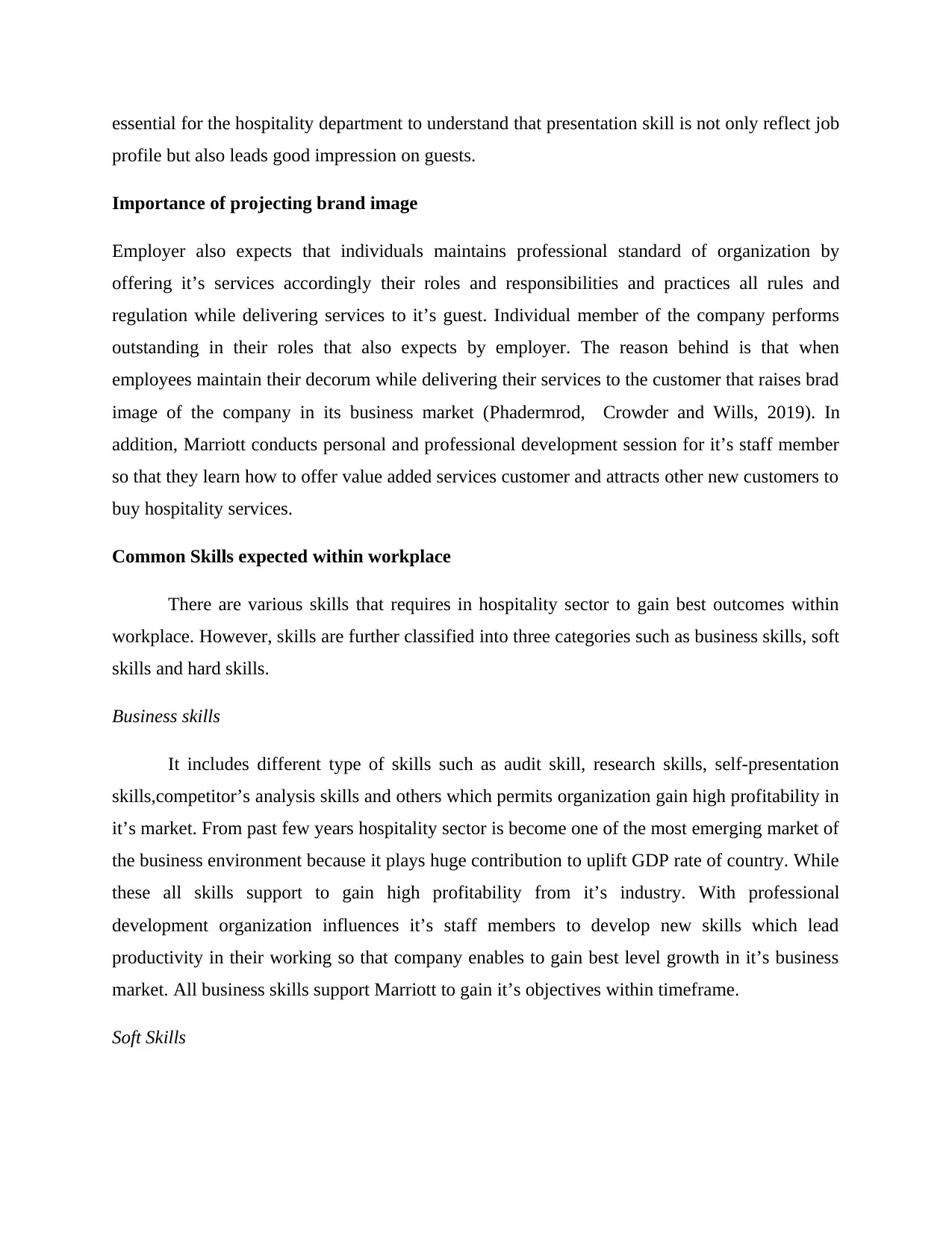
essential for the hospitality department to understand that presentation skill is not only reflect job
profile but also leads good impression on guests.
Importance of projecting brand image
Employer also expects that individuals maintains professional standard of organization by
offering it’s services accordingly their roles and responsibilities and practices all rules and
regulation while delivering services to it’s guest. Individual member of the company performs
outstanding in their roles that also expects by employer. The reason behind is that when
employees maintain their decorum while delivering their services to the customer that raises brad
image of the company in its business market (Phadermrod, Crowder and Wills, 2019). In
addition, Marriott conducts personal and professional development session for it’s staff member
so that they learn how to offer value added services customer and attracts other new customers to
buy hospitality services.
Common Skills expected within workplace
There are various skills that requires in hospitality sector to gain best outcomes within
workplace. However, skills are further classified into three categories such as business skills, soft
skills and hard skills.
Business skills
It includes different type of skills such as audit skill, research skills, self-presentation
skills,competitor’s analysis skills and others which permits organization gain high profitability in
it’s market. From past few years hospitality sector is become one of the most emerging market of
the business environment because it plays huge contribution to uplift GDP rate of country. While
these all skills support to gain high profitability from it’s industry. With professional
development organization influences it’s staff members to develop new skills which lead
productivity in their working so that company enables to gain best level growth in it’s business
market. All business skills support Marriott to gain it’s objectives within timeframe.
Soft Skills
profile but also leads good impression on guests.
Importance of projecting brand image
Employer also expects that individuals maintains professional standard of organization by
offering it’s services accordingly their roles and responsibilities and practices all rules and
regulation while delivering services to it’s guest. Individual member of the company performs
outstanding in their roles that also expects by employer. The reason behind is that when
employees maintain their decorum while delivering their services to the customer that raises brad
image of the company in its business market (Phadermrod, Crowder and Wills, 2019). In
addition, Marriott conducts personal and professional development session for it’s staff member
so that they learn how to offer value added services customer and attracts other new customers to
buy hospitality services.
Common Skills expected within workplace
There are various skills that requires in hospitality sector to gain best outcomes within
workplace. However, skills are further classified into three categories such as business skills, soft
skills and hard skills.
Business skills
It includes different type of skills such as audit skill, research skills, self-presentation
skills,competitor’s analysis skills and others which permits organization gain high profitability in
it’s market. From past few years hospitality sector is become one of the most emerging market of
the business environment because it plays huge contribution to uplift GDP rate of country. While
these all skills support to gain high profitability from it’s industry. With professional
development organization influences it’s staff members to develop new skills which lead
productivity in their working so that company enables to gain best level growth in it’s business
market. All business skills support Marriott to gain it’s objectives within timeframe.
Soft Skills
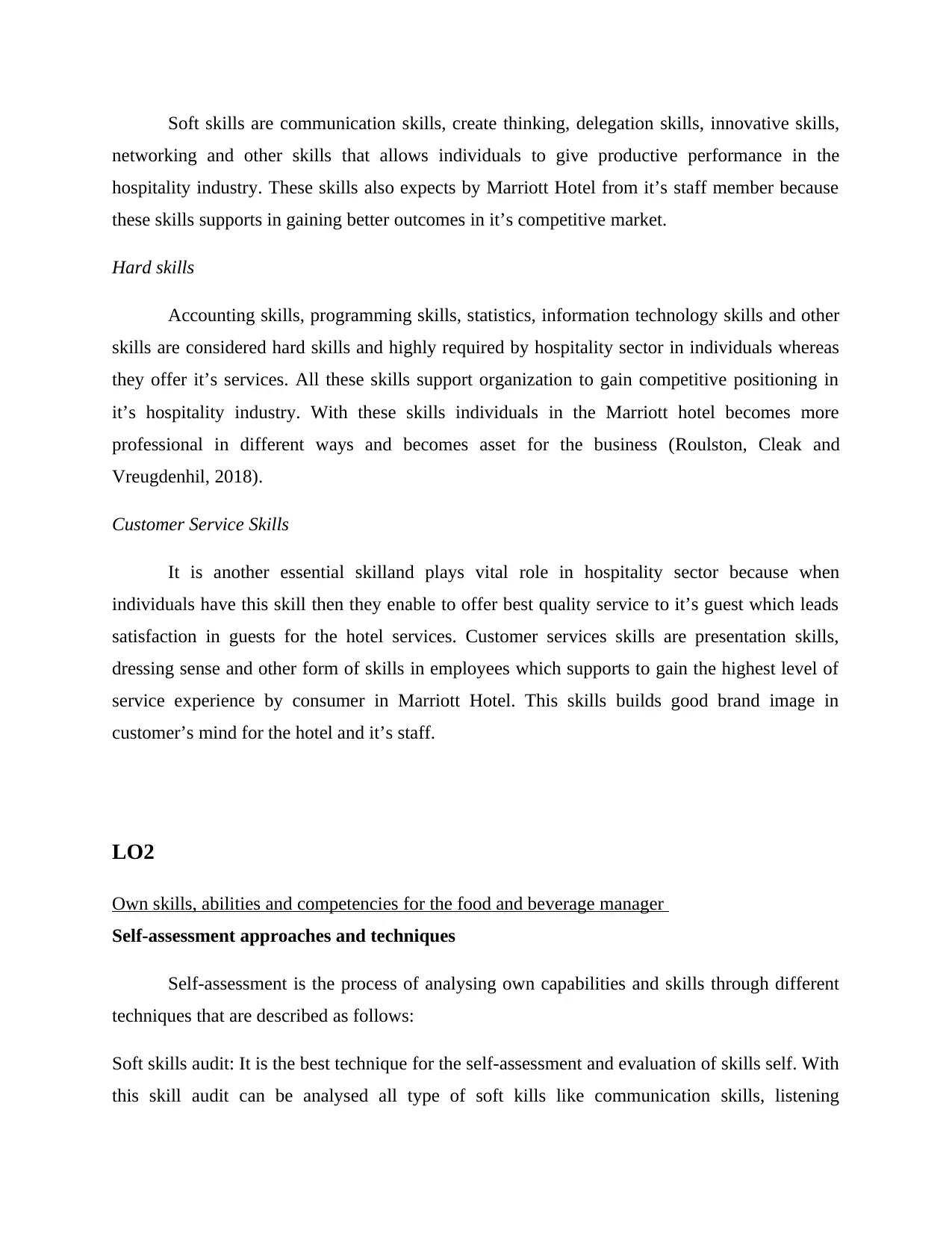
Soft skills are communication skills, create thinking, delegation skills, innovative skills,
networking and other skills that allows individuals to give productive performance in the
hospitality industry. These skills also expects by Marriott Hotel from it’s staff member because
these skills supports in gaining better outcomes in it’s competitive market.
Hard skills
Accounting skills, programming skills, statistics, information technology skills and other
skills are considered hard skills and highly required by hospitality sector in individuals whereas
they offer it’s services. All these skills support organization to gain competitive positioning in
it’s hospitality industry. With these skills individuals in the Marriott hotel becomes more
professional in different ways and becomes asset for the business (Roulston, Cleak and
Vreugdenhil, 2018).
Customer Service Skills
It is another essential skilland plays vital role in hospitality sector because when
individuals have this skill then they enable to offer best quality service to it’s guest which leads
satisfaction in guests for the hotel services. Customer services skills are presentation skills,
dressing sense and other form of skills in employees which supports to gain the highest level of
service experience by consumer in Marriott Hotel. This skills builds good brand image in
customer’s mind for the hotel and it’s staff.
LO2
Own skills, abilities and competencies for the food and beverage manager
Self-assessment approaches and techniques
Self-assessment is the process of analysing own capabilities and skills through different
techniques that are described as follows:
Soft skills audit: It is the best technique for the self-assessment and evaluation of skills self. With
this skill audit can be analysed all type of soft kills like communication skills, listening
networking and other skills that allows individuals to give productive performance in the
hospitality industry. These skills also expects by Marriott Hotel from it’s staff member because
these skills supports in gaining better outcomes in it’s competitive market.
Hard skills
Accounting skills, programming skills, statistics, information technology skills and other
skills are considered hard skills and highly required by hospitality sector in individuals whereas
they offer it’s services. All these skills support organization to gain competitive positioning in
it’s hospitality industry. With these skills individuals in the Marriott hotel becomes more
professional in different ways and becomes asset for the business (Roulston, Cleak and
Vreugdenhil, 2018).
Customer Service Skills
It is another essential skilland plays vital role in hospitality sector because when
individuals have this skill then they enable to offer best quality service to it’s guest which leads
satisfaction in guests for the hotel services. Customer services skills are presentation skills,
dressing sense and other form of skills in employees which supports to gain the highest level of
service experience by consumer in Marriott Hotel. This skills builds good brand image in
customer’s mind for the hotel and it’s staff.
LO2
Own skills, abilities and competencies for the food and beverage manager
Self-assessment approaches and techniques
Self-assessment is the process of analysing own capabilities and skills through different
techniques that are described as follows:
Soft skills audit: It is the best technique for the self-assessment and evaluation of skills self. With
this skill audit can be analysed all type of soft kills like communication skills, listening
⊘ This is a preview!⊘
Do you want full access?
Subscribe today to unlock all pages.

Trusted by 1+ million students worldwide
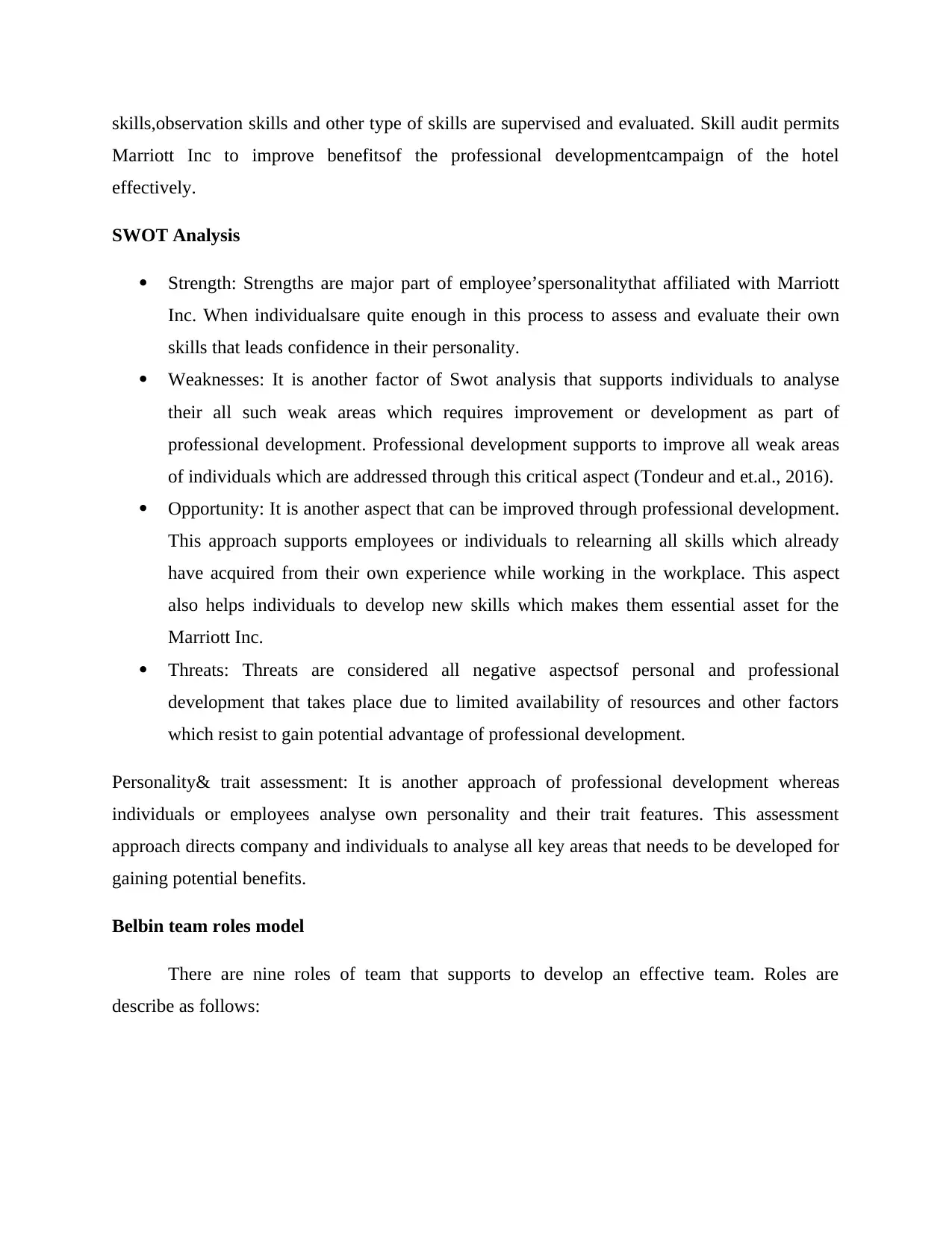
skills,observation skills and other type of skills are supervised and evaluated. Skill audit permits
Marriott Inc to improve benefitsof the professional developmentcampaign of the hotel
effectively.
SWOT Analysis
Strength: Strengths are major part of employee’spersonalitythat affiliated with Marriott
Inc. When individualsare quite enough in this process to assess and evaluate their own
skills that leads confidence in their personality.
Weaknesses: It is another factor of Swot analysis that supports individuals to analyse
their all such weak areas which requires improvement or development as part of
professional development. Professional development supports to improve all weak areas
of individuals which are addressed through this critical aspect (Tondeur and et.al., 2016).
Opportunity: It is another aspect that can be improved through professional development.
This approach supports employees or individuals to relearning all skills which already
have acquired from their own experience while working in the workplace. This aspect
also helps individuals to develop new skills which makes them essential asset for the
Marriott Inc.
Threats: Threats are considered all negative aspectsof personal and professional
development that takes place due to limited availability of resources and other factors
which resist to gain potential advantage of professional development.
Personality& trait assessment: It is another approach of professional development whereas
individuals or employees analyse own personality and their trait features. This assessment
approach directs company and individuals to analyse all key areas that needs to be developed for
gaining potential benefits.
Belbin team roles model
There are nine roles of team that supports to develop an effective team. Roles are
describe as follows:
Marriott Inc to improve benefitsof the professional developmentcampaign of the hotel
effectively.
SWOT Analysis
Strength: Strengths are major part of employee’spersonalitythat affiliated with Marriott
Inc. When individualsare quite enough in this process to assess and evaluate their own
skills that leads confidence in their personality.
Weaknesses: It is another factor of Swot analysis that supports individuals to analyse
their all such weak areas which requires improvement or development as part of
professional development. Professional development supports to improve all weak areas
of individuals which are addressed through this critical aspect (Tondeur and et.al., 2016).
Opportunity: It is another aspect that can be improved through professional development.
This approach supports employees or individuals to relearning all skills which already
have acquired from their own experience while working in the workplace. This aspect
also helps individuals to develop new skills which makes them essential asset for the
Marriott Inc.
Threats: Threats are considered all negative aspectsof personal and professional
development that takes place due to limited availability of resources and other factors
which resist to gain potential advantage of professional development.
Personality& trait assessment: It is another approach of professional development whereas
individuals or employees analyse own personality and their trait features. This assessment
approach directs company and individuals to analyse all key areas that needs to be developed for
gaining potential benefits.
Belbin team roles model
There are nine roles of team that supports to develop an effective team. Roles are
describe as follows:
Paraphrase This Document
Need a fresh take? Get an instant paraphrase of this document with our AI Paraphraser
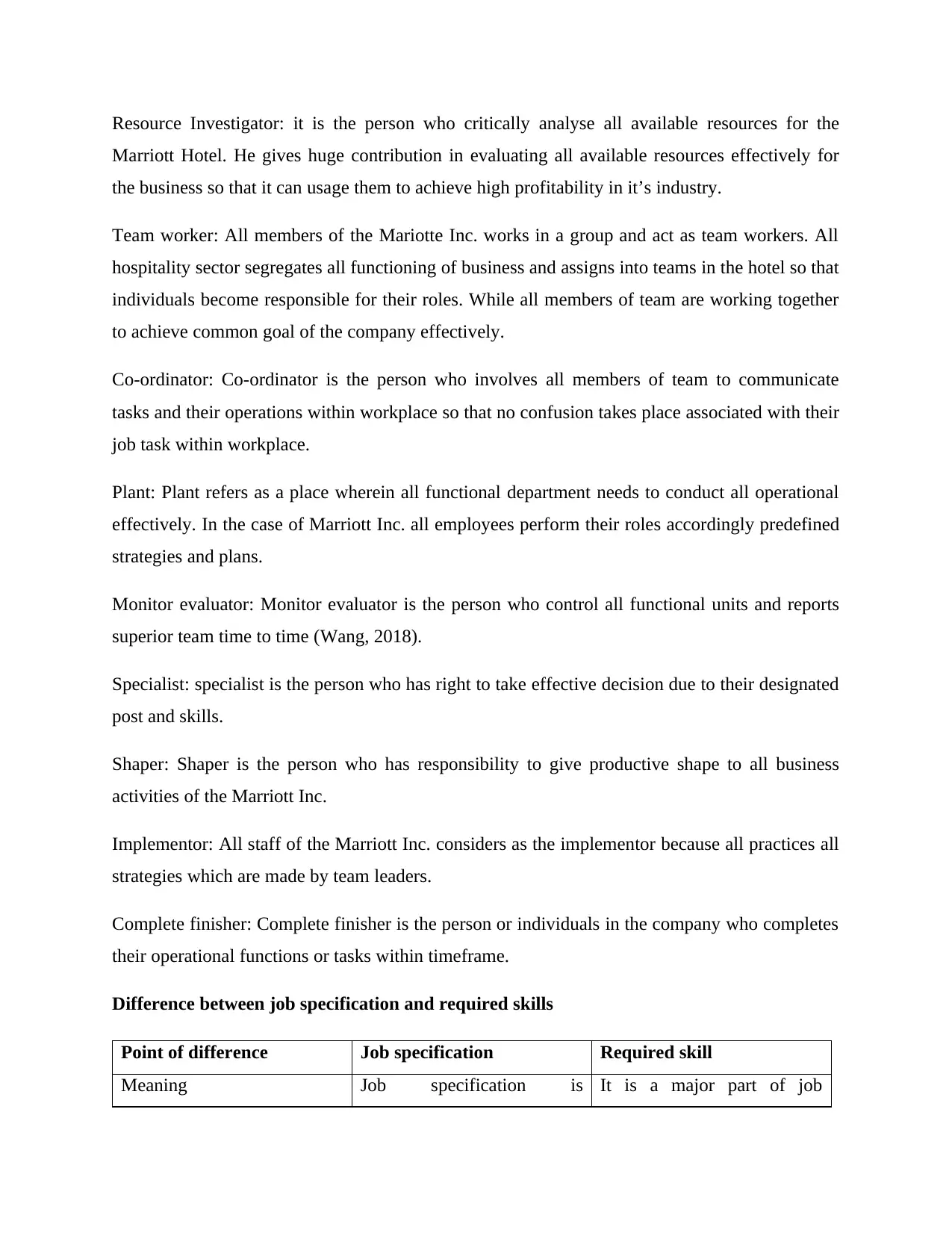
Resource Investigator: it is the person who critically analyse all available resources for the
Marriott Hotel. He gives huge contribution in evaluating all available resources effectively for
the business so that it can usage them to achieve high profitability in it’s industry.
Team worker: All members of the Mariotte Inc. works in a group and act as team workers. All
hospitality sector segregates all functioning of business and assigns into teams in the hotel so that
individuals become responsible for their roles. While all members of team are working together
to achieve common goal of the company effectively.
Co-ordinator: Co-ordinator is the person who involves all members of team to communicate
tasks and their operations within workplace so that no confusion takes place associated with their
job task within workplace.
Plant: Plant refers as a place wherein all functional department needs to conduct all operational
effectively. In the case of Marriott Inc. all employees perform their roles accordingly predefined
strategies and plans.
Monitor evaluator: Monitor evaluator is the person who control all functional units and reports
superior team time to time (Wang, 2018).
Specialist: specialist is the person who has right to take effective decision due to their designated
post and skills.
Shaper: Shaper is the person who has responsibility to give productive shape to all business
activities of the Marriott Inc.
Implementor: All staff of the Marriott Inc. considers as the implementor because all practices all
strategies which are made by team leaders.
Complete finisher: Complete finisher is the person or individuals in the company who completes
their operational functions or tasks within timeframe.
Difference between job specification and required skills
Point of difference Job specification Required skill
Meaning Job specification is It is a major part of job
Marriott Hotel. He gives huge contribution in evaluating all available resources effectively for
the business so that it can usage them to achieve high profitability in it’s industry.
Team worker: All members of the Mariotte Inc. works in a group and act as team workers. All
hospitality sector segregates all functioning of business and assigns into teams in the hotel so that
individuals become responsible for their roles. While all members of team are working together
to achieve common goal of the company effectively.
Co-ordinator: Co-ordinator is the person who involves all members of team to communicate
tasks and their operations within workplace so that no confusion takes place associated with their
job task within workplace.
Plant: Plant refers as a place wherein all functional department needs to conduct all operational
effectively. In the case of Marriott Inc. all employees perform their roles accordingly predefined
strategies and plans.
Monitor evaluator: Monitor evaluator is the person who control all functional units and reports
superior team time to time (Wang, 2018).
Specialist: specialist is the person who has right to take effective decision due to their designated
post and skills.
Shaper: Shaper is the person who has responsibility to give productive shape to all business
activities of the Marriott Inc.
Implementor: All staff of the Marriott Inc. considers as the implementor because all practices all
strategies which are made by team leaders.
Complete finisher: Complete finisher is the person or individuals in the company who completes
their operational functions or tasks within timeframe.
Difference between job specification and required skills
Point of difference Job specification Required skill
Meaning Job specification is It is a major part of job
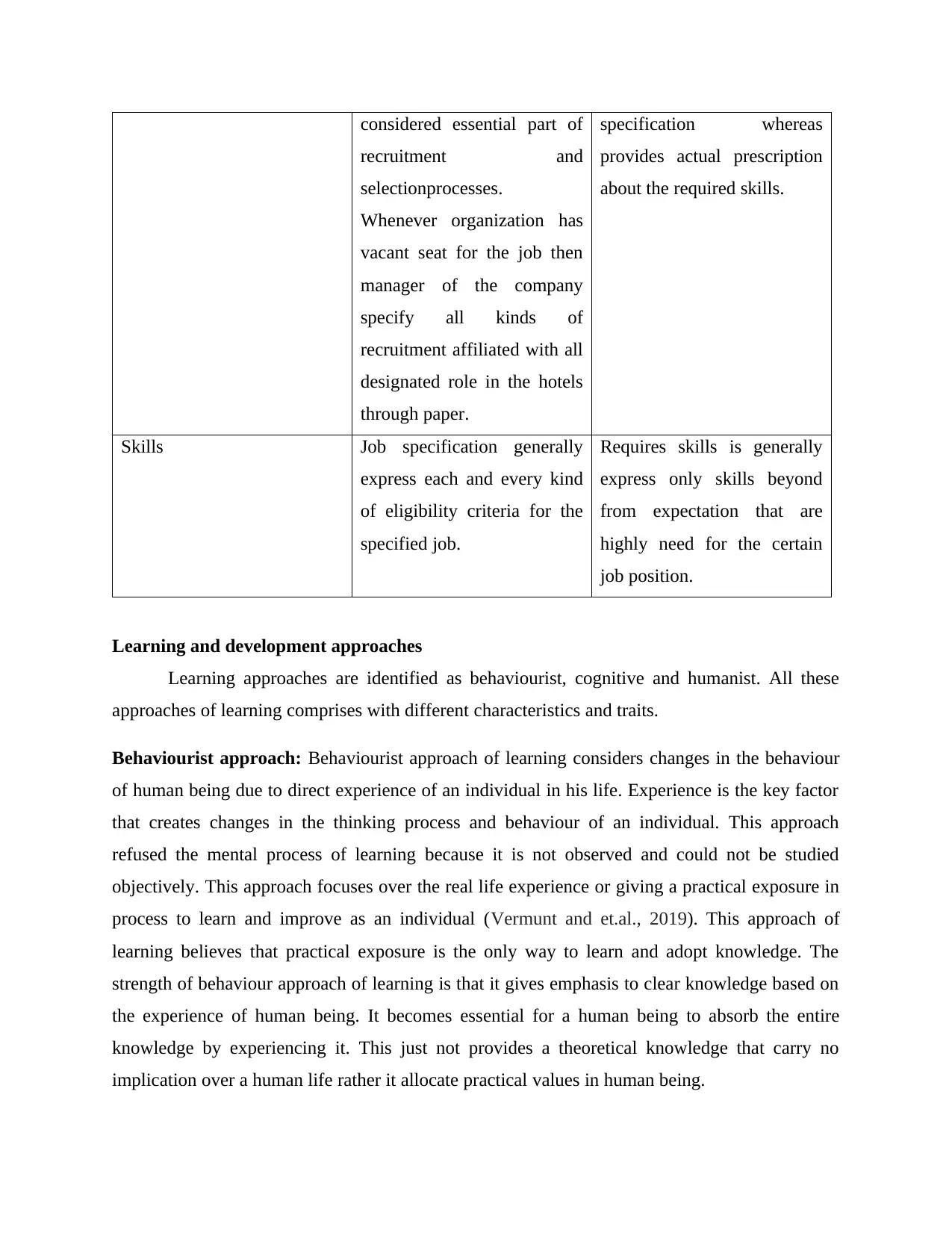
considered essential part of
recruitment and
selectionprocesses.
Whenever organization has
vacant seat for the job then
manager of the company
specify all kinds of
recruitment affiliated with all
designated role in the hotels
through paper.
specification whereas
provides actual prescription
about the required skills.
Skills Job specification generally
express each and every kind
of eligibility criteria for the
specified job.
Requires skills is generally
express only skills beyond
from expectation that are
highly need for the certain
job position.
Learning and development approaches
Learning approaches are identified as behaviourist, cognitive and humanist. All these
approaches of learning comprises with different characteristics and traits.
Behaviourist approach: Behaviourist approach of learning considers changes in the behaviour
of human being due to direct experience of an individual in his life. Experience is the key factor
that creates changes in the thinking process and behaviour of an individual. This approach
refused the mental process of learning because it is not observed and could not be studied
objectively. This approach focuses over the real life experience or giving a practical exposure in
process to learn and improve as an individual (Vermunt and et.al., 2019). This approach of
learning believes that practical exposure is the only way to learn and adopt knowledge. The
strength of behaviour approach of learning is that it gives emphasis to clear knowledge based on
the experience of human being. It becomes essential for a human being to absorb the entire
knowledge by experiencing it. This just not provides a theoretical knowledge that carry no
implication over a human life rather it allocate practical values in human being.
recruitment and
selectionprocesses.
Whenever organization has
vacant seat for the job then
manager of the company
specify all kinds of
recruitment affiliated with all
designated role in the hotels
through paper.
specification whereas
provides actual prescription
about the required skills.
Skills Job specification generally
express each and every kind
of eligibility criteria for the
specified job.
Requires skills is generally
express only skills beyond
from expectation that are
highly need for the certain
job position.
Learning and development approaches
Learning approaches are identified as behaviourist, cognitive and humanist. All these
approaches of learning comprises with different characteristics and traits.
Behaviourist approach: Behaviourist approach of learning considers changes in the behaviour
of human being due to direct experience of an individual in his life. Experience is the key factor
that creates changes in the thinking process and behaviour of an individual. This approach
refused the mental process of learning because it is not observed and could not be studied
objectively. This approach focuses over the real life experience or giving a practical exposure in
process to learn and improve as an individual (Vermunt and et.al., 2019). This approach of
learning believes that practical exposure is the only way to learn and adopt knowledge. The
strength of behaviour approach of learning is that it gives emphasis to clear knowledge based on
the experience of human being. It becomes essential for a human being to absorb the entire
knowledge by experiencing it. This just not provides a theoretical knowledge that carry no
implication over a human life rather it allocate practical values in human being.
⊘ This is a preview!⊘
Do you want full access?
Subscribe today to unlock all pages.

Trusted by 1+ million students worldwide
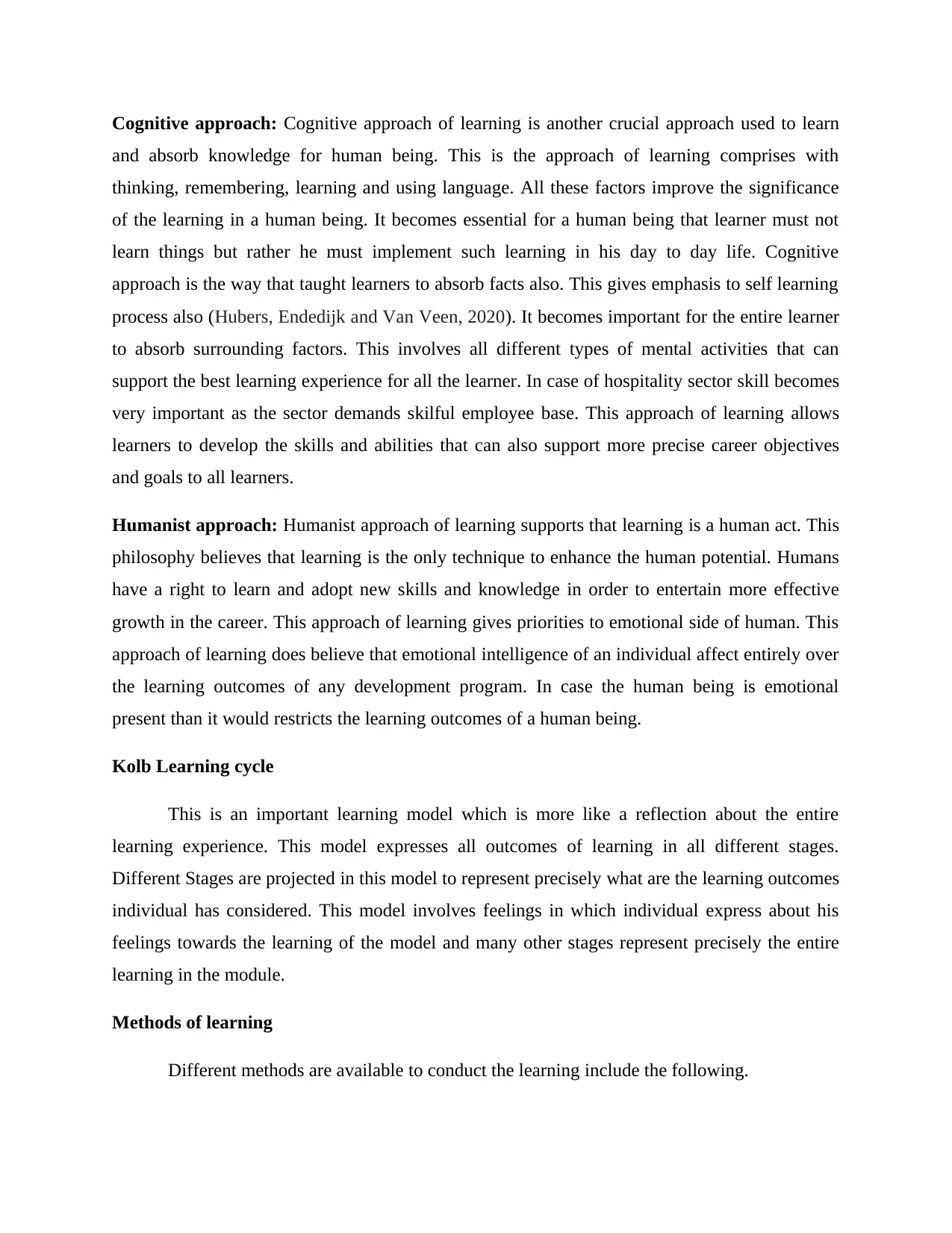
Cognitive approach: Cognitive approach of learning is another crucial approach used to learn
and absorb knowledge for human being. This is the approach of learning comprises with
thinking, remembering, learning and using language. All these factors improve the significance
of the learning in a human being. It becomes essential for a human being that learner must not
learn things but rather he must implement such learning in his day to day life. Cognitive
approach is the way that taught learners to absorb facts also. This gives emphasis to self learning
process also (Hubers, Endedijk and Van Veen, 2020). It becomes important for the entire learner
to absorb surrounding factors. This involves all different types of mental activities that can
support the best learning experience for all the learner. In case of hospitality sector skill becomes
very important as the sector demands skilful employee base. This approach of learning allows
learners to develop the skills and abilities that can also support more precise career objectives
and goals to all learners.
Humanist approach: Humanist approach of learning supports that learning is a human act. This
philosophy believes that learning is the only technique to enhance the human potential. Humans
have a right to learn and adopt new skills and knowledge in order to entertain more effective
growth in the career. This approach of learning gives priorities to emotional side of human. This
approach of learning does believe that emotional intelligence of an individual affect entirely over
the learning outcomes of any development program. In case the human being is emotional
present than it would restricts the learning outcomes of a human being.
Kolb Learning cycle
This is an important learning model which is more like a reflection about the entire
learning experience. This model expresses all outcomes of learning in all different stages.
Different Stages are projected in this model to represent precisely what are the learning outcomes
individual has considered. This model involves feelings in which individual express about his
feelings towards the learning of the model and many other stages represent precisely the entire
learning in the module.
Methods of learning
Different methods are available to conduct the learning include the following.
and absorb knowledge for human being. This is the approach of learning comprises with
thinking, remembering, learning and using language. All these factors improve the significance
of the learning in a human being. It becomes essential for a human being that learner must not
learn things but rather he must implement such learning in his day to day life. Cognitive
approach is the way that taught learners to absorb facts also. This gives emphasis to self learning
process also (Hubers, Endedijk and Van Veen, 2020). It becomes important for the entire learner
to absorb surrounding factors. This involves all different types of mental activities that can
support the best learning experience for all the learner. In case of hospitality sector skill becomes
very important as the sector demands skilful employee base. This approach of learning allows
learners to develop the skills and abilities that can also support more precise career objectives
and goals to all learners.
Humanist approach: Humanist approach of learning supports that learning is a human act. This
philosophy believes that learning is the only technique to enhance the human potential. Humans
have a right to learn and adopt new skills and knowledge in order to entertain more effective
growth in the career. This approach of learning gives priorities to emotional side of human. This
approach of learning does believe that emotional intelligence of an individual affect entirely over
the learning outcomes of any development program. In case the human being is emotional
present than it would restricts the learning outcomes of a human being.
Kolb Learning cycle
This is an important learning model which is more like a reflection about the entire
learning experience. This model expresses all outcomes of learning in all different stages.
Different Stages are projected in this model to represent precisely what are the learning outcomes
individual has considered. This model involves feelings in which individual express about his
feelings towards the learning of the model and many other stages represent precisely the entire
learning in the module.
Methods of learning
Different methods are available to conduct the learning include the following.
Paraphrase This Document
Need a fresh take? Get an instant paraphrase of this document with our AI Paraphraser
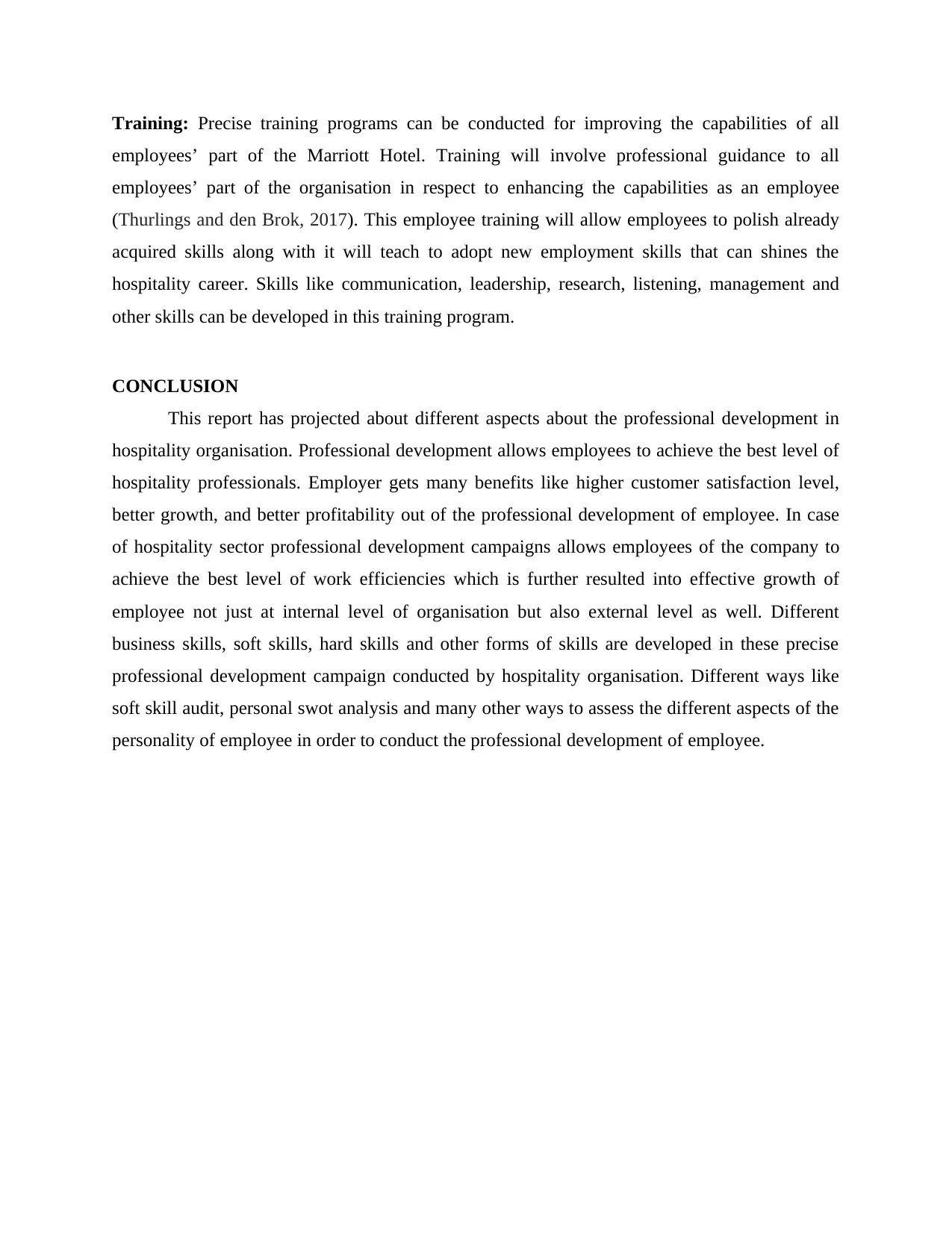
Training: Precise training programs can be conducted for improving the capabilities of all
employees’ part of the Marriott Hotel. Training will involve professional guidance to all
employees’ part of the organisation in respect to enhancing the capabilities as an employee
(Thurlings and den Brok, 2017). This employee training will allow employees to polish already
acquired skills along with it will teach to adopt new employment skills that can shines the
hospitality career. Skills like communication, leadership, research, listening, management and
other skills can be developed in this training program.
CONCLUSION
This report has projected about different aspects about the professional development in
hospitality organisation. Professional development allows employees to achieve the best level of
hospitality professionals. Employer gets many benefits like higher customer satisfaction level,
better growth, and better profitability out of the professional development of employee. In case
of hospitality sector professional development campaigns allows employees of the company to
achieve the best level of work efficiencies which is further resulted into effective growth of
employee not just at internal level of organisation but also external level as well. Different
business skills, soft skills, hard skills and other forms of skills are developed in these precise
professional development campaign conducted by hospitality organisation. Different ways like
soft skill audit, personal swot analysis and many other ways to assess the different aspects of the
personality of employee in order to conduct the professional development of employee.
employees’ part of the Marriott Hotel. Training will involve professional guidance to all
employees’ part of the organisation in respect to enhancing the capabilities as an employee
(Thurlings and den Brok, 2017). This employee training will allow employees to polish already
acquired skills along with it will teach to adopt new employment skills that can shines the
hospitality career. Skills like communication, leadership, research, listening, management and
other skills can be developed in this training program.
CONCLUSION
This report has projected about different aspects about the professional development in
hospitality organisation. Professional development allows employees to achieve the best level of
hospitality professionals. Employer gets many benefits like higher customer satisfaction level,
better growth, and better profitability out of the professional development of employee. In case
of hospitality sector professional development campaigns allows employees of the company to
achieve the best level of work efficiencies which is further resulted into effective growth of
employee not just at internal level of organisation but also external level as well. Different
business skills, soft skills, hard skills and other forms of skills are developed in these precise
professional development campaign conducted by hospitality organisation. Different ways like
soft skill audit, personal swot analysis and many other ways to assess the different aspects of the
personality of employee in order to conduct the professional development of employee.
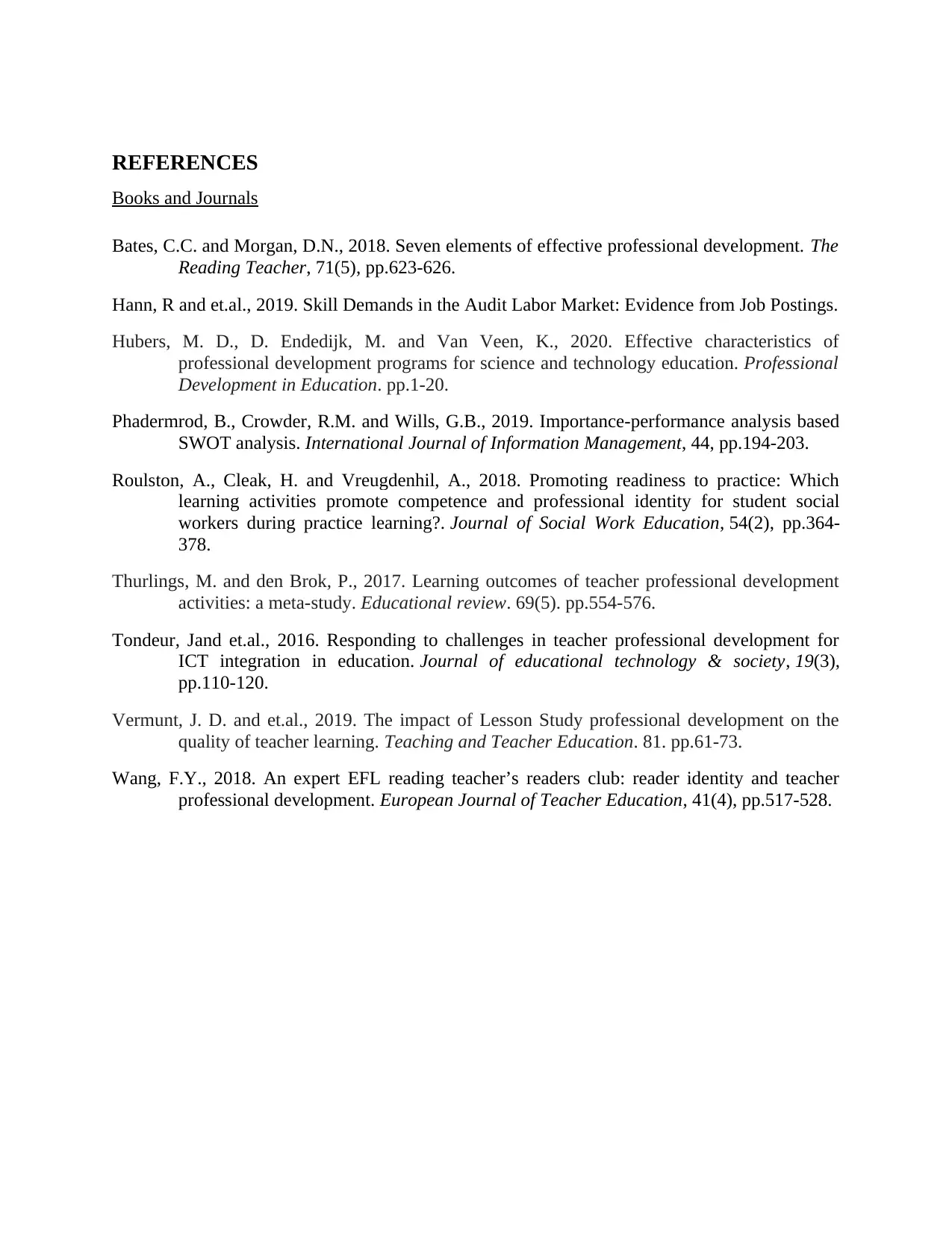
REFERENCES
Books and Journals
Bates, C.C. and Morgan, D.N., 2018. Seven elements of effective professional development. The
Reading Teacher, 71(5), pp.623-626.
Hann, R and et.al., 2019. Skill Demands in the Audit Labor Market: Evidence from Job Postings.
Hubers, M. D., D. Endedijk, M. and Van Veen, K., 2020. Effective characteristics of
professional development programs for science and technology education. Professional
Development in Education. pp.1-20.
Phadermrod, B., Crowder, R.M. and Wills, G.B., 2019. Importance-performance analysis based
SWOT analysis. International Journal of Information Management, 44, pp.194-203.
Roulston, A., Cleak, H. and Vreugdenhil, A., 2018. Promoting readiness to practice: Which
learning activities promote competence and professional identity for student social
workers during practice learning?. Journal of Social Work Education, 54(2), pp.364-
378.
Thurlings, M. and den Brok, P., 2017. Learning outcomes of teacher professional development
activities: a meta-study. Educational review. 69(5). pp.554-576.
Tondeur, Jand et.al., 2016. Responding to challenges in teacher professional development for
ICT integration in education. Journal of educational technology & society, 19(3),
pp.110-120.
Vermunt, J. D. and et.al., 2019. The impact of Lesson Study professional development on the
quality of teacher learning. Teaching and Teacher Education. 81. pp.61-73.
Wang, F.Y., 2018. An expert EFL reading teacher’s readers club: reader identity and teacher
professional development. European Journal of Teacher Education, 41(4), pp.517-528.
Books and Journals
Bates, C.C. and Morgan, D.N., 2018. Seven elements of effective professional development. The
Reading Teacher, 71(5), pp.623-626.
Hann, R and et.al., 2019. Skill Demands in the Audit Labor Market: Evidence from Job Postings.
Hubers, M. D., D. Endedijk, M. and Van Veen, K., 2020. Effective characteristics of
professional development programs for science and technology education. Professional
Development in Education. pp.1-20.
Phadermrod, B., Crowder, R.M. and Wills, G.B., 2019. Importance-performance analysis based
SWOT analysis. International Journal of Information Management, 44, pp.194-203.
Roulston, A., Cleak, H. and Vreugdenhil, A., 2018. Promoting readiness to practice: Which
learning activities promote competence and professional identity for student social
workers during practice learning?. Journal of Social Work Education, 54(2), pp.364-
378.
Thurlings, M. and den Brok, P., 2017. Learning outcomes of teacher professional development
activities: a meta-study. Educational review. 69(5). pp.554-576.
Tondeur, Jand et.al., 2016. Responding to challenges in teacher professional development for
ICT integration in education. Journal of educational technology & society, 19(3),
pp.110-120.
Vermunt, J. D. and et.al., 2019. The impact of Lesson Study professional development on the
quality of teacher learning. Teaching and Teacher Education. 81. pp.61-73.
Wang, F.Y., 2018. An expert EFL reading teacher’s readers club: reader identity and teacher
professional development. European Journal of Teacher Education, 41(4), pp.517-528.
⊘ This is a preview!⊘
Do you want full access?
Subscribe today to unlock all pages.

Trusted by 1+ million students worldwide
1 out of 12
Related Documents
Your All-in-One AI-Powered Toolkit for Academic Success.
+13062052269
info@desklib.com
Available 24*7 on WhatsApp / Email
![[object Object]](/_next/static/media/star-bottom.7253800d.svg)
Unlock your academic potential
Copyright © 2020–2026 A2Z Services. All Rights Reserved. Developed and managed by ZUCOL.





